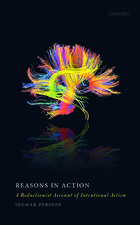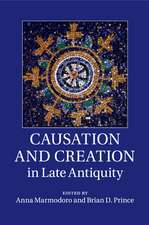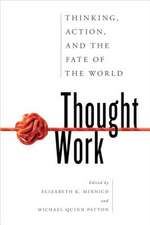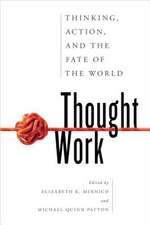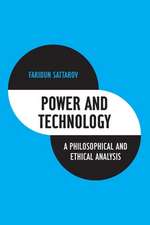Artificial Dispositions: Investigating Ethical and Metaphysical Issues
Editat de William A. Bauer, Anna Marmodoroen Limba Engleză Hardback – 24 ian 2024
Preț: 511.40 lei
Preț vechi: 731.77 lei
-30% Nou
Puncte Express: 767
Preț estimativ în valută:
97.87€ • 101.10$ • 81.45£
97.87€ • 101.10$ • 81.45£
Carte tipărită la comandă
Livrare economică 25 martie-08 aprilie
Preluare comenzi: 021 569.72.76
Specificații
ISBN-13: 9781350336117
ISBN-10: 1350336114
Pagini: 272
Dimensiuni: 156 x 234 mm
Greutate: 0.56 kg
Editura: Bloomsbury Publishing
Colecția Bloomsbury Academic
Locul publicării:London, United Kingdom
ISBN-10: 1350336114
Pagini: 272
Dimensiuni: 156 x 234 mm
Greutate: 0.56 kg
Editura: Bloomsbury Publishing
Colecția Bloomsbury Academic
Locul publicării:London, United Kingdom
Caracteristici
Explores the metaphysical and ethical underpinnings of automation, computation and artificial intelligence applications
Notă biografică
William A. Bauer is Associate Teaching Professor at North Carolina State University, USA. Anna Marmodoro is Full Professor of Philosophy at Durham University, UK and Associate Member of the Faculty of Philosophy, University of Oxford, UK.
Cuprins
PrefaceAcknowledgments Introduction, William A. Bauer (North Carolina State University, USA) and Anna Marmodoro (University of Oxford, UK) Part I. Artificial and Natural Dispositions1. Is There a Metaphysically Robust Distinction between Artificial and Natural Dispositions?, Joaquim Giannotti (Universidad de Chile, Chile)2. The Metaphysics of Artificial Dispositions, Jennifer McKitrick (University of Nebraska-Lincoln, USA)3. Classification and Artificial Dispositions, Andrew McFarland (LaGuardia Community College, City University of New York, USA) Part II. Artificial Systems and Their Dispositions4. Artificial Systems as Disposition Bearers, Lauren Ashwell (Bates College, USA)5. Harnessing Power, Neil E. Williams (University at Buffalo, USA) Part III. Agency, Mind, and Artificial Dispositions6. What Superheroes Can Teach Us About the Metaphysics of Human Enhancement Technology, Sungho Choi (Kyung Hee University, South Korea)7. Intelligent Capacities in Artificial Systems, Atoosa Kasirzadeh (University of Edinburgh and The Alan Turing Institute, UK) and Victoria McGeer (Australian National University, Australia, and Princeton University, USA)8. Powerful Qualities, Phenomenal Properties and AI, Ashley Coates (University of Witwatersrand, South Africa) Part IV. Artificial Moral Dispositions9. The Very Notion of Artificial Moral Agency. The Case and Place of Artificial Moral Dispositions, Emma Ruttkamp-Bloem (University of Pretoria and the South African Centre for AI Research, South Africa)10. Is AI Capable of Aristotelian Full Moral Virtue? The Rational Power of phronesis, Machine Learning, and the Metaphysics of Regularity, Ruth Porter Groff (Saint Louis University, USA) and John Symons (University of Kansas, USA)11. Artificial Moral Dispositions in Humans and Computers, Thomas Powers (University of Delaware, USA) Notes on Contributors Index
Recenzii
Natural dispositions such as solubility and irascibility have received considerable attention in recent years, but the advent of AI has opened up new and challenging horizons. Artificial Dispositions is a timely, wide-ranging collection of essays on a morally salient topic with deep philosophical roots and far-reaching theoretical and practical implications.
Dispositions, entities with a foot in both actuality and the realm of mere possibility, have long puzzled and fascinated philosophers. This important collection of essays by leading experts on the philosophy of dispositions refines and leverages the notion of artificial disposition to address pressing philosophical issues concerning AI and morality.
This book puts the spotlight on those dispositions that are so dear to design theory, engineering, and education, and yet underevaluated in much of the current debate on dispositions. Human enhancement, artificial intelligence, and artificial moral agency all find their discussion in this inspiring volume.
Dispositions, entities with a foot in both actuality and the realm of mere possibility, have long puzzled and fascinated philosophers. This important collection of essays by leading experts on the philosophy of dispositions refines and leverages the notion of artificial disposition to address pressing philosophical issues concerning AI and morality.
This book puts the spotlight on those dispositions that are so dear to design theory, engineering, and education, and yet underevaluated in much of the current debate on dispositions. Human enhancement, artificial intelligence, and artificial moral agency all find their discussion in this inspiring volume.









